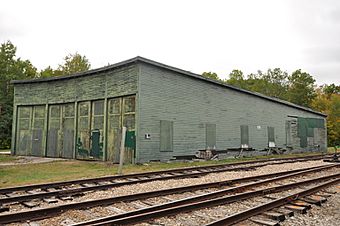Bartlett Roundhouse facts for kids
|
Bartlett Roundhouse
|
|
 |
|
| Location | S. of US 302, Bartlett, New Hampshire |
|---|---|
| Area | less than one acre |
| Built | 1887 |
| Architectural style | Railroad Turntable; Roundhouse |
| NRHP reference No. | 15000664 |
Quick facts for kids Significant dates |
|
| Added to NRHP | September 29, 2015 |
Imagine a special garage for trains! The Bartlett Roundhouse, also called the Bartlett Engine House, is a historic building in Bartlett, New Hampshire. It was built a long time ago, in 1887-1888. This building helped keep trains running smoothly.
A roundhouse is a building where train engines were stored and repaired. It usually has a circular shape, or parts of a circle. Right outside the building, there was a large spinning platform called a railroad turntable. This turntable helped move train engines into different repair bays.
The Bartlett Roundhouse reminds us how important railroads were. They helped the local economy grow many years ago. This historic site was added to the National Register of Historic Places in 2015. It was also listed on the New Hampshire State Register of Historic Places in 2008.
What Does the Bartlett Roundhouse Look Like?
The Bartlett Roundhouse is in the western part of Bartlett village. It is a tall, single-story building made of wood. The building has an arched shape. On its east side, there are four entrances for train engines.
The outside of the building is covered with wooden siding. It has a flat roof. In front of the engine entrances, you can still see parts of the old railroad turntable. This is where the trains would turn around.
Why Was the Roundhouse Built?
The roundhouse was built in 1887-1888. It was built by a company called the Portland and Ogdensburg Railway. Its main job was to be a service point for steam locomotives. These extra engines were needed to help push trains up the very steep hills of Crawford Notch.
In 1888, another company, the Maine Central Railroad, took over the railway. They continued to use the roundhouse. It was an important place for maintaining their trains.
How Did the Roundhouse Change Over Time?
The roundhouse was used until 1958. That's when regular passenger train service stopped on that line. Over the years, the building changed. In 1913, two of the engine bays were made longer. This was to fit bigger, newer train engines.
Around 1950, two other bays were taken down. This happened because the roundhouse was not used as much anymore. After it stopped being a train service facility, the state bought it. They used it to store sand and other materials until the 1980s.
Today, a local non-profit group is working to restore the Bartlett Roundhouse. They want to bring this important piece of railroad history back to life!
 | Charles R. Drew |
 | Benjamin Banneker |
 | Jane C. Wright |
 | Roger Arliner Young |



